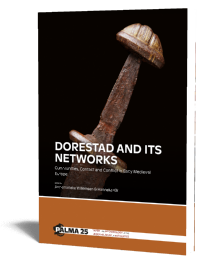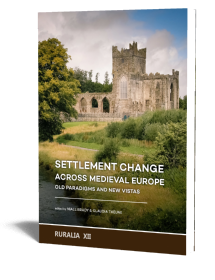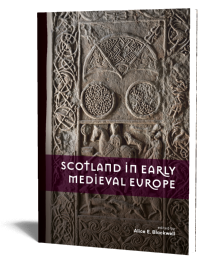Cremation in the Early Middle Ages
Death, fire and identity in North-West Europe
Edited by Howard Williams & Femke Lippok | 2024

Cremation in the Early Middle Ages
Death, fire and identity in North-West Europe
Edited by Howard Williams & Femke Lippok | 2024
Paperback ISBN: 9789464270990 | Hardback ISBN: 9789464271003 | Imprint: Sidestone Press Academics | Format: 210x280mm | 302 pp. | Language: English | 25 illus. (bw) | 83 illus. (fc) | Keywords: cremation; early medieval; burning; funerary archaeology; cremains | download cover | DOI: 10.59641/e3h9b0c1d2 | CC-license: CC BY-NC-ND 4.0
Read online or downloaded 730 times
-
Digital & Online access
This is a full Open Access publication, click below to buy in print, browse, or download for free.
-
Buy via Sidestone (EU & UK)
-
Buy via our Distributors (WORLD)
For non-EU or UK destinations you can buy our books via our international distributors. Although prices may vary this will ensure speedy delivery and reduction in shipping costs or import tax. But you can also order with us directly via the module above.
UK international distributor
USA international distributor
-
Bookinfo
Paperback ISBN: 9789464270990 | Hardback ISBN: 9789464271003 | Imprint: Sidestone Press Academics | Format: 210x280mm | 302 pp. | Language: English | 25 illus. (bw) | 83 illus. (fc) | Keywords: cremation; early medieval; burning; funerary archaeology; cremains | download cover | DOI: 10.59641/e3h9b0c1d2 | CC-license: CC BY-NC-ND 4.0
Read online or downloaded 730 times

We will plant a tree for each order containing a paperback or hardback book via OneTreePlanted.org.
Cremation in the Early Middle Ages draws together the latest research and thinking on early medieval cremation practices. The book takes you on a journey through 19 chapters exploring cremation practices from the fifth to the eleventh centuries CE in Fennoscandia, the UK and Ireland, Frisia, Denmark, Germany, Belgium, and France. In this way, the book aims to be a central resource for anyone interested in early medieval cremations, or indeed funerary practices more generally. Notably, the structure and style of this book represent a departure from the norm. As well as a co-authored introduction, chapters constitute a conversation between the editors and key researchers captured via structured interviews, supported by a series of fact boxes highlighting key ideas, methods and techniques, sites, graves and discoveries.
Cremation was no single disposal tradition in the Early Middle Ages: it constituted but one dimension of local, regional and supra-regional deathways operating across different locales and with varying degrees of expenditure, meanings and materials, as well as involved a complex range of resources, environments, practices and performances both before, during and after the burning of the bodies. Where cremation is not the dominant burial rite, our authors reflect on the potential under-representation of cremation in our models. Ethnic and cultural labelling of the early medieval cremated dead are countered and critiqued by various authors.
Important themes that are touched upon are the long-term collectivity and longue durée of cremation depositions, variability within cremation practices, the pre-burial life of cinerary containers, ideas of personhood, the immersion of cremains in watery locations, the socio-political and economic context of burial rites, monumentalisation, the interpretation of mixed-rite (bi-ritual) cemeteries, the importance of human-animal entanglements viewed through the lens of cremated deposition, the potential for greater experimental and osteoarcheological, experimental, isotopic, radiocarbon, and genomic research, and the effect and usefulness of written texts as a window onto early medieval cremation practices, in particular regarding the relationship between cremation and Christianisation.
Foreword: Death and Fire
Frans Theuws
Introduction: Death and Fire in Early Medieval North-West Europe
Femke Lippok and Howard Williams
Cremation in Finland
Anna Wessman
Western Slavic Cremation Practices:Past Work, Current Perspectives and Future Directions
Leszek Gardeła
Cremations in Central Sweden during the Vendel and Viking Periods
John Ljungkvist
Western Norwegian Cremation Practices from the Viking Age:Opulent Grave Goods, Absent Bones, and Elemental Archaeologies
Leszek Gardeła
Cremation in Southern Scandinavia: The Case of South-West Jutland
Sarah Croix
Cremation in Northern Germany: from the Bronze Age to the Viking Age
Helene Agerskov Rose
Early Medieval Frisia – Cremation Practices Alongside the southern North Sea Coast
Egge Knol
Cremation on the Frankish Northern Periphery
Rica Annaert
Cremation Practices in Early Medieval Southern Germany
Raimund Masanz
Cremation Practices in Merovingian and Carolingian Cemeteries from Northern France
Vanessa Brunet, Erwan Nivez and Astrid A. Noterman
The Bioarchaeology of Early Medieval Cremation Practices in England
Kirsty Squires
Potted Histories: Insights into Early Medieval Cremation Practices from the Study of Funerary Ceramics
Gareth Perry
Historiography and Archaeology, the Adventus Saxonum, and the Politics of the Early Middle Ages
James M. Harland
Isotopes and Halls of Marrow: Investigating the Viking Age Cremations at Heath Wood, Ingleby
Tessi Löffelmann
Cremation Practices from Early Medieval Ireland: Burnt Christians and Interpretative Paradigms
Patrick Gleeson
Burning Questions: Learning to See Cremation in the Long Iron Age of Northern Britain
Adrián Maldonado
Early Medieval Cremation Burials in Atlantic Northern Britain
Russell Ó Ríagáin
Cremation in Context: Scientific Applications Going from ‘Meh’ to ‘Yeah!’
Barbara Veselka
How to Build a Cremation Pyre: Insights from Experimental Archaeology
Austin Mason
Prof. Dr. Howard Williams
Howard Williams is Professor of Archaeology at the University of Chester. Famous for his work on the study of death, burial and commemoration in Early Medieval Britain and Scandinavia, Howard also actively engages his audience through his well-loved blog and other social media channels.
Femke Lippok Mphil
Femke Lippok is an early medieval archaeologist focused on changing burial rituals and ritual economies in early medieval North Western Europe. She is currently employed by the Mero-Jewel project as an academic researcher at the Royal Museum of Art and History in Brussels (KMKG/MRAH). She is simultaneously finishing her PhD dissertation at Leiden University.
Abstract:
Cremation in the Early Middle Ages draws together the latest research and thinking on early medieval cremation practices. The book takes you on a journey through 19 chapters exploring cremation practices from the fifth to the eleventh centuries CE in Fennoscandia, the UK and Ireland, Frisia, Denmark, Germany, Belgium, and France. In this way, the book aims to be a central resource for anyone interested in early medieval cremations, or indeed funerary practices more generally. Notably, the structure and style of this book represent a departure from the norm. As well as a co-authored introduction, chapters constitute a conversation between the editors and key researchers captured via structured interviews, supported by a series of fact boxes highlighting key ideas, methods and techniques, sites, graves and discoveries.
Cremation was no single disposal tradition in the Early Middle Ages: it constituted but one dimension of local, regional and supra-regional deathways operating across different locales and with varying degrees of expenditure, meanings and materials, as well as involved a complex range of resources, environments, practices and performances both before, during and after the burning of the bodies. Where cremation is not the dominant burial rite, our authors reflect on the potential under-representation of cremation in our models. Ethnic and cultural labelling of the early medieval cremated dead are countered and critiqued by various authors.
Important themes that are touched upon are the long-term collectivity and longue durée of cremation depositions, variability within cremation practices, the pre-burial life of cinerary containers, ideas of personhood, the immersion of cremains in watery locations, the socio-political and economic context of burial rites, monumentalisation, the interpretation of mixed-rite (bi-ritual) cemeteries, the importance of human-animal entanglements viewed through the lens of cremated deposition, the potential for greater experimental and osteoarcheological, experimental, isotopic, radiocarbon, and genomic research, and the effect and usefulness of written texts as a window onto early medieval cremation practices, in particular regarding the relationship between cremation and Christianisation.
Contents
Foreword: Death and Fire
Frans Theuws
Introduction: Death and Fire in Early Medieval North-West Europe
Femke Lippok and Howard Williams
Cremation in Finland
Anna Wessman
Western Slavic Cremation Practices:Past Work, Current Perspectives and Future Directions
Leszek Gardeła
Cremations in Central Sweden during the Vendel and Viking Periods
John Ljungkvist
Western Norwegian Cremation Practices from the Viking Age:Opulent Grave Goods, Absent Bones, and Elemental Archaeologies
Leszek Gardeła
Cremation in Southern Scandinavia: The Case of South-West Jutland
Sarah Croix
Cremation in Northern Germany: from the Bronze Age to the Viking Age
Helene Agerskov Rose
Early Medieval Frisia – Cremation Practices Alongside the southern North Sea Coast
Egge Knol
Cremation on the Frankish Northern Periphery
Rica Annaert
Cremation Practices in Early Medieval Southern Germany
Raimund Masanz
Cremation Practices in Merovingian and Carolingian Cemeteries from Northern France
Vanessa Brunet, Erwan Nivez and Astrid A. Noterman
The Bioarchaeology of Early Medieval Cremation Practices in England
Kirsty Squires
Potted Histories: Insights into Early Medieval Cremation Practices from the Study of Funerary Ceramics
Gareth Perry
Historiography and Archaeology, the Adventus Saxonum, and the Politics of the Early Middle Ages
James M. Harland
Isotopes and Halls of Marrow: Investigating the Viking Age Cremations at Heath Wood, Ingleby
Tessi Löffelmann
Cremation Practices from Early Medieval Ireland: Burnt Christians and Interpretative Paradigms
Patrick Gleeson
Burning Questions: Learning to See Cremation in the Long Iron Age of Northern Britain
Adrián Maldonado
Early Medieval Cremation Burials in Atlantic Northern Britain
Russell Ó Ríagáin
Cremation in Context: Scientific Applications Going from ‘Meh’ to ‘Yeah!’
Barbara Veselka
How to Build a Cremation Pyre: Insights from Experimental Archaeology
Austin Mason
Prof. Dr. Howard Williams
Howard Williams is Professor of Archaeology at the University of Chester. Famous for his work on the study of death, burial and commemoration in Early Medieval Britain and Scandinavia, Howard also actively engages his audience through his well-loved blog and other social media channels.
Femke Lippok Mphil
Femke Lippok is an early medieval archaeologist focused on changing burial rituals and ritual economies in early medieval North Western Europe. She is currently employed by the Mero-Jewel project as an academic researcher at the Royal Museum of Art and History in Brussels (KMKG/MRAH). She is simultaneously finishing her PhD dissertation at Leiden University.
-
Digital & Online access
This is a full Open Access publication, click below to buy in print, browse, or download for free.
-
Buy via Sidestone (EU & UK)
-
Buy via our Distributors (WORLD)
For non-EU or UK destinations you can buy our books via our international distributors. Although prices may vary this will ensure speedy delivery and reduction in shipping costs or import tax. But you can also order with us directly via the module above.
UK international distributor
USA international distributor
- Browse all books by subject
-
Search all books

We will plant a tree for each order containing a paperback or hardback book via OneTreePlanted.org.
You might also like:
© 2026 Sidestone Press KvK nr. 28114891 Privacy policy Sidestone Newsletter Terms and Conditions (Dutch)








